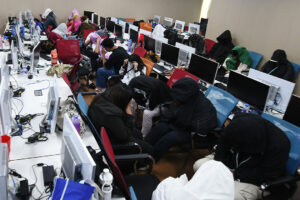Labor department completes profiling of almost 28,000 POGO workers
THE DEPARTMENT of Labor and Employment (DoLE) on Monday said it has completed profiling of almost 28,000 direct workers of Philippine Offshore and Gaming Operators (POGO), in line with President Ferdinand R. Marcos, Jr.’s order of total ban. It, however, struggles to find employment for the displaced workers despite intensified job fair initiatives. In a […]

THE DEPARTMENT of Labor and Employment (DoLE) on Monday said it has completed profiling of almost 28,000 direct workers of Philippine Offshore and Gaming Operators (POGO), in line with President Ferdinand R. Marcos, Jr.’s order of total ban.
It, however, struggles to find employment for the displaced workers despite intensified job fair initiatives.
In a news briefing in Manila City, the Labor department said the total number of POGO workers, now called Internet Gaming Licensees (IGLs), is at 27,790 across Metro Manila, Region IV-A (Cavite, Laguna, Batangas, Rizal, Quezon and Region VII (Central Visayas).
This only accounted for direct IGL workers, excluding indirect workers, which DoLE earlier said, could reach over 30,567 individuals.
In his third State of the Nation Address in July, Mr. Marcos ordered to ban all forms of IGLs by Dec. 31 due to growing concerns about illegal activities, such as human trafficking and scamming.
Labor Secretary Bienvenido E. Laguesma told reporters on Monday the department is intensifying job fairs to find employment for affected workers, noting they are set to host another job fair in Biñan, Laguna on Friday.
Despite this, Mr. Laguesma admitted the turnout for job fairs is still low, which could be linked to workers who remain skeptical that a total ban would materialize by year-end as well as the lack of guarantee that workers will secure the jobs they prefer.
“Maybe they want to look for a job similar to what they are currently doing that offers the same or even better benefits, most of the job vacancies offered in job fairs are mostly entry-level positions,” he added in mixed English and Filipino.
This has prompted the DoLE National Capital Region to adjust to attract employers by offering high-level positions to encourage IGL workers’ participation.
Despite the deadline for the total ban being at year-end, the labor chief said they would not stop helping affected workers even after the deadline.
DoLE said in a statement, 202 IGL workers were hired on the spot in the past four job fairs; 435 workers secured Unemployment Insurance Benefit from the Social Security System; 708 IGL employees enlisted for employment facilitation; and 2 IGL workers referred for skills or technical training.
DoLE Assistant Secretary Paul Vincent W. Añover said livelihood intervention through self-employment is also a strategy of the department in helping affected laborers.
Over 118 former IGL workers have availed such assistance, he said.
To further encourage affected IGL workers, jobseekers are encouraged to browse through PhilJobNet, which offers about 2 million vacancies.
Meanwhile, the Bureau of Immigration (BI) has reiterated anew its call for foreign workers employed by IGLs to adhere to the government-mandated deadline to leave the country by Dec. 31.
BI Commissioner Joel Anthony M. Viado said that as of Nov. 7, a total of 21,757 foreign nationals associated with IGL operations voluntarily downgraded their work visas to temporary visitor visas.
Out of the approved applications for downgrading, 10,821 foreign nationals have so far left the country already, he said.
In October, the Bureau issued visa cancellation orders to 12,106 foreign nationals who had yet to downgrade their visas. These individuals are required to leave the country before the year-end deadline.
The BI warned that those who fail to comply will face deportation proceedings and a permanent ban from reentering the Philippines.
It anticipates the departure of approximately 20,000 more foreign IGL workers in the coming weeks.
Affected individuals are strongly advised to act promptly to meet the deadline and avoid potential legal consequences. — Chloe Mari A. Hufana
















